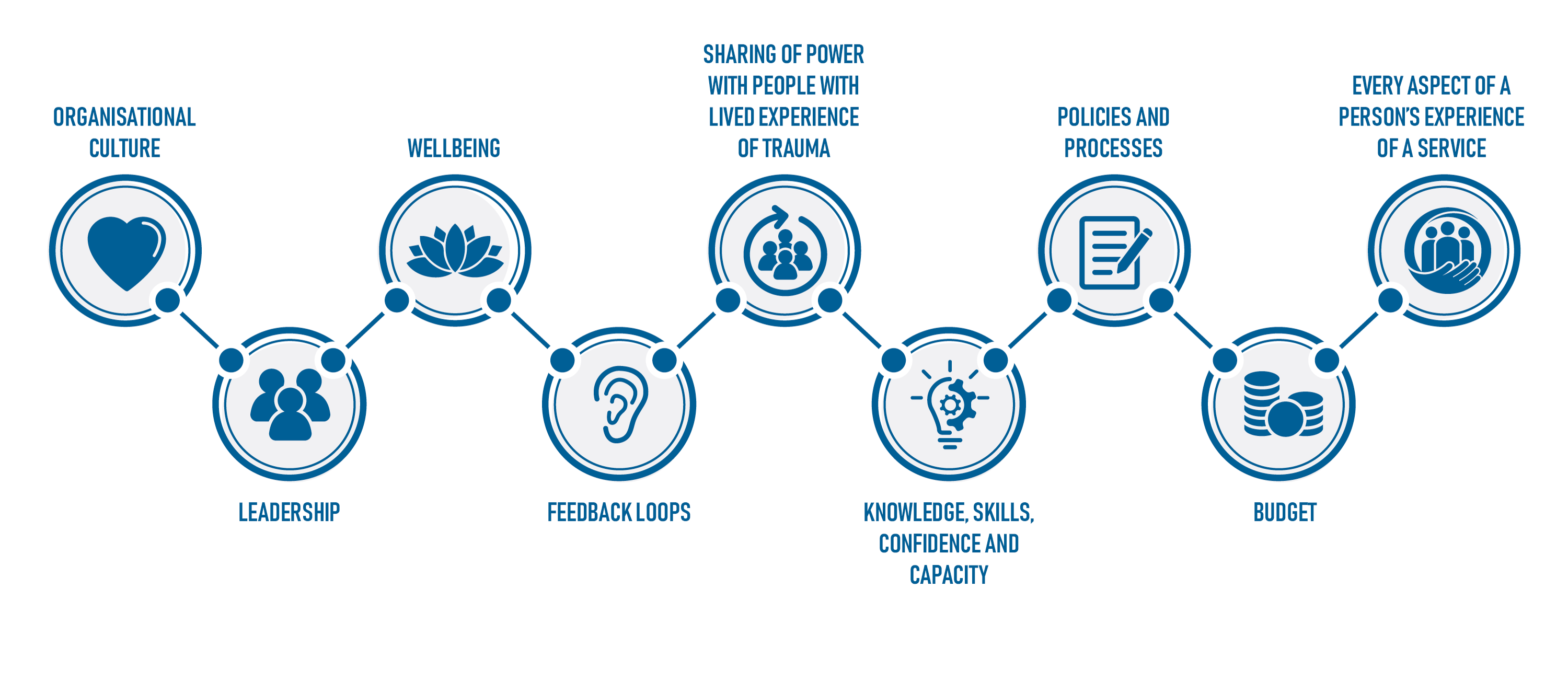Implementation
The resources in this section are intended to support the implementation of trauma-informed and responsive approaches and can be used flexibly and independently by any team, service or organisation in any sector in Scotland.
A Roadmap for Creating Trauma-Informed and Responsive Change: Guidance for Organisations, Systems and Workforces in Scotland (2023)
This Roadmap has been designed to help services and organisations identify and reflect on progress, strengths and opportunities for embedding a trauma-informed and responsive approach across policy and practice.

The resource is based on the evidence base, existing learning and good practice from the Scottish context and existing relevant Scottish frameworks and guidance. It draws extensively on what people with lived experience of trauma have said would help improve access to support, reduce re-traumatisation, recognise resilience and support recovery. The resource also draws on what experts by profession and leaders across services/ organisations have told us would support them to implement a trauma-informed and responsive approach.
It has two key sections:
Part 1: provides an overview of why trauma-informed and responsive organisations, systems and workforces matter and what good looks like.
Part 2: is a self assessment checklist that includes a roadmap of activities that, based on growing evidence, are most effective in supporting services and organisations in their journey towards becoming trauma informed and responsive.
There are also a small number of appendices that contain further information/ tools to support with the suggested activities.
Access the Roadmap and Supporting Resources
Key Drivers
As outlined in the Roadmap, there is growing evidence which shows that the following key drivers are essential for embedding and sustaining trauma-informed and responsive practice within an organisation.

Organisational Culture
An organisational culture that recognises the impact of trauma and sees being trauma informed as a way of working and an approach to everything that it does rather than as a standalone specific intervention or project, and where the key principles are intrinsic within and across the organisation and second nature to everyone.
Leadership
Leadership at all levels that understands, drives and inspires trauma-informed change, embodies the key principles and builds accountability for long-term improvement.
Staff Care, Support and Wellbeing
Staff who experience their wellbeing as valued and prioritised, and they have time and space to access relevant proactive, protective and reactive wellbeing supports.
Feedback Loops
Feedback loops from people accessing, working in and with the organisation that are used to strengthen continued improvement.
Sharing of Power with People with Lived Experience of Trauma
Routine, meaningful sharing of power with people with lived experience of trauma so that services and systems are collaboratively designed and delivered around people’s needs,
rather than around the needs of organisations and systems.
Staff Knowledge, Skills, Confidence and Capacity
Staff to have the knowledge, skills, confidence and capacity to recognise and respond to people affected by trauma, through training and implementation support relevant to their job role and service remit.
Policies and Processes
Policies and processes that reflect an understanding of the prevalence and impact of trauma and ‘hard wire’ a trauma informed approach into all that the organisation does.
Budget
A budget that reflects this work as a priority, supports long term commitment to embedding a trauma-informed and responsive approach and ensures there are sufficient resources for this work.
Service Design and Delivery
A commitment to ensuring that every aspect of a person’s experience of a service—from first contact and relationships with staff to experiences of physical environments, communication and processes such as referrals and assessments—is underpinned by safety, choice, trust, collaboration and empowerment.
Organisational Window of Tolerance
Organisations are made up of people, and it can be helpful to think collectively about the organisation’s cultural Window of Tolerance and how that might be affected by external drivers, leadership behaviours and tensions and stresses than an organisation might adapt to or react to. Find out more in the video below.
Organisational Window of Tolerance
In this clip, Jennie Young, formerly NHS Education for Scotland, talks about the impact of psychological trauma on the window of tolerance in organisations, services and systems
We are continuing to build our understanding of what works to successfully and sustainability implement trauma-informed and responsive practice across all sectors of the workforce through pathfinder projects, case studies and thematic deep dive events.